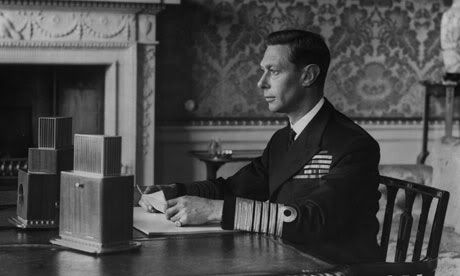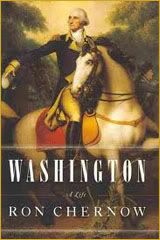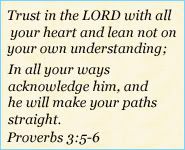 |
September 3, 1939, after Britain's declaration of war
against Germany.
[Photograph: Hulton-Deutsch Collection/Corbis]
Alexandre Desplat wrote the music for the multiple Oscar-winning The King's Speech. His contribution to the film didn't win an Oscar, and instead the prize for Best Original Score went to the less deserving The Social Network.
Desplat wrote the score for Roman Polanski's 2010 The Ghost Writer, which I reviewed here. Below is what I wrote about the sound and music in the film, where I compare Desplat to Bernard Herrmann, who composed the music for many of Alfred Hitchcock's films:
Desplat’s composition for The Ghost Writer skillfully integrates sound with images by introducing themes, accentuating suspense, and exposing emotions as varied as romance and fear...Desplat, who worked closely with the film footage, incorporates many ambient sounds like car horns and clanking iron into his score. Desplat uses this as his resounding motif, producing a melodic sequence that uses the rise and fall of the foghorn’s moans to accentuate the sense of danger.The sound in The King's Speech is less ambitious than in The Ghost Writer. Perhaps Desplat didn't want to detract too much from the images. Although there are motifs that run through the film that musically define characters and scenes for us, they are less pronounced than in The Ghost Writer. I get the feeling that Desplat may have been given less leeway with is craft, and toned down his creativity. But ultimately his signature style is there, and he skillfully combines music (less sound here) and image to give us a sensitive portrait of the stuttering King.
It is hard not to compare Desplat with Alfred Hitchcock’s prized composer Bernard Herrmann. In Vertigo, Herrmann incorporates a foghorn’s call for danger in his score. Madeleine’s theme song in Vertigo is reciprocated in Desplat’s musical sketch of Lang’s unhappy wife in “The Truth about Ruth.” This composition, at times romantic, at times melancholic, shows us more of Ruth than she herself is willing. Lang also has his own theme song, “Lang’s Memoirs,” which is played at discrete moments when McGregor watches Lang expose his true nature. The soundtrack ironically seem more truthful and authentic than the images, as Hitchcock also frequently showed in his films.
Unlike many soundtracks (and music for film) Desplat's scores stand on their own, and can be listened to separate from the films. His minimalist, delicate (often piano) notes, verging a little on the sentimental, have enough interesting variations to fill a CD.
The King Speech is a well-made film. That sound is an integral part to the film is a testament to its craft. The story is one of redemption, brought about by strength and hard work, the real way, and not through some magical fortuity. King George's speech therapist who coaches him and guides him, tells him, "You have such perseverance, Bertie, you're the bravest man I know."
And the King doesn't disappoint, or falter. At the moment of reckoning, when the whole of England was depending on him, he delivers his radio speech, in a padded room behind a giant microphone, and tells the British people:
We have been forced into a conflict, for we are called, with our allies, to meet the challenge of a principle which, if it were to prevail, would be fatal to any civilized order in the world...Below is the complete speech (and here is a recording):
The task will be hard. There may be dark days ahead, and war can no longer be confined to the battlefield, but we can only do the right as we see the right, and reverently commit our cause to God. If one and all we keep resolutely faithful to it, ready for whatever service or sacrifice it may demand, then with God's help, we shall prevail.
In this grave hour, perhaps the most fateful in our history, I send to every household of my peoples, both at home and overseas, this message, spoken with the same depth of feeling for each one of you as if I were able to cross your threshold and speak to you myself.-------------------------------------------------------------------------
For the second time in the lives of most of us, we are at war.
Over and over again, we have tried to find a peaceful way out of the differences between ourselves and those who are now our enemies; but it has been in vain.
We have been forced into a conflict, for we are called, with our allies, to meet the challenge of a principle which, if it were to prevail, would be fatal to any civilized order in the world.
It is a principle which permits a state, in the selfish pursuit of power, to disregard its treaties and its solemn pledges, which sanctions the use of force or threat of force against the sovereignty and independence of other states.
Such a principle, stripped of all disguise, is surely the mere primitive doctrine that might is right, and if this principle were established through the world, the freedom of our own country and of the whole British Commonwealth of nations would be in danger.
But far more than this, the peoples of the world would be kept in bondage of fear, and all hopes of settled peace and of the security, of justice and liberty, among nations, would be ended.
This is the ultimate issue which confronts us. For the sake of all that we ourselves hold dear, and of the world order and peace, it is unthinkable that we should refuse to meet the challenge.
It is to this high purpose that I now call my people at home, and my peoples across the seas, who will make our cause their own.
I ask them to stand calm and firm and united in this time of trial.
The task will be hard. There may be dark days ahead, and war can no longer be confined to the battlefield, but we can only do the right as we see the right, and reverently commit our cause to God. If one and all we keep resolutely faithful to it, ready for whatever service or sacrifice it may demand, then with God's help, we shall prevail.
May He bless and keep us all.
Blog posts at Camera Lucida on film and music:
- Truth and Fiction in Polanski's The Ghost Writer
- As Time Goes By
- When the Moon Hits Your Eye
- Yes Sir, That's My Baby
- Country Strong?
- Blues at The Cotton Club
- Music from You Will Meet a Tall Dark Stranger
- Gabriel Yared's Soundtrack
- Fellini and Music
- Australia: Whose Land is it Anyway?













